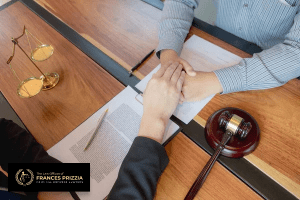 What a domestic violence statement rec ent looks like" width="301" height="200" />
What a domestic violence statement rec ent looks like" width="301" height="200" /> What a domestic violence statement rec ent looks like" width="301" height="200" />
What a domestic violence statement rec ent looks like" width="301" height="200" />

When facing a domestic violence charge, the situation can quickly become complex and stressful. One key aspect that can significantly alter the course of a case is when a witness, often the alleged victim, recants their statement. This means they take back or change their initial statement about the events. Understanding the implications of this and what it entails is crucial for those engaged in such a case.
At Frances Prizzia Criminal Defense Lawyers, we understand the impact of domestic violence charges. When an alleged domestic violence victim recants, it can change the nature of the criminal charges against you. Our law firm is here to be your guide through the criminal justice system.
Learn more about the impact of recantation on your criminal case. Then, contact our experienced criminal defense attorney to schedule a case consultation.
A victim recanting their statement in a domestic violence case occurs when the alleged victim or witness changes or withdraws their previous statement. This can mean they no longer agree with what was initially reported to the authorities. Recantation can happen at any stage of the legal process, from before charges are filed to during a trial.
Recanting a statement does not automatically mean the charges will be dropped. The decision to continue with the prosecution can depend on various factors, including the nature of the evidence. Understanding the legal nuances of recantation is crucial for those engaged in a domestic violence case. Reach out to us to learn more about how this might impact your case.

When a witness recants their statement in a domestic violence case, it can significantly impact the case. The prosecution may need to re-evaluate the strength of their evidence. However, a recantation doesn't always mean the case will weaken or be dismissed. This is also true for anyone facing a felony domestic violence charge.
A recanted statement can challenge the prosecution's case, especially if the statement was a key piece of evidence. The prosecution must then decide whether to proceed based on the remaining evidence. This could include physical evidence, other witness statements, or prior incidents. This might still be enough to move forward with the case even if the accuser decides to recant a domestic violence statement.
However, it's important to note that a case can still proceed even without the recanted statement. The district attorney's office might argue that the recantation is due to intimidation or fear. They could also rely on other evidence gathered during the investigation.
Recanting a statement in a domestic violence case can have legal consequences for the victim. If they initially gave a false statement, they might face charges for filing a false report or perjury. However, if their recantation is genuine and based on a misinterpretation of events, these charges might not apply.
In some cases, the court might suspect coercion or pressure behind the recantation. This could lead to an investigation into whether the defendant or someone else influenced the victim’s decision to recant.
Courts often approach recanted statements with caution. They understand that domestic violence cases can involve complex personal dynamics, which might influence a victim’s willingness to testify. Therefore, they carefully examine the reasons behind the recantation.
Judges and juries might consider whether the recantation seems genuine or if there's evidence of coercion. They also evaluate the entire body of evidence, not just the recanted statement, to make a fair judgment.
Defense attorneys play a crucial role when a victim recants their statement. They can challenge the credibility of the original statement and argue for the dismissal of charges. However, they must do this carefully, respecting the legal rights of all parties involved.
In cases of recantation, defense lawyers might also investigate the reasons behind the change in testimony. They work to ensure that the defendant's rights are protected throughout the legal process.

When dealing with recanted statements in court, defense attorneys employ various strategies. They might question the validity of the original statement and highlight inconsistencies. They also assess the impact of the recantation on the overall strength of the prosecution's case.
Another strategy involves examining the motivations behind the recantation. Defense attorneys need to make sure they are prepared for all possibilities. We will do the same in your case but push for the best possible outcome for you.
A recanted statement in a domestic violence case does not guarantee a dismissal. The prosecution evaluates the case's strength without the recanted statement. They consider other available evidence and the seriousness of the alleged offense.
The prosecutor's decision on whether to proceed with a case after a recantation is critical. They assess the remaining evidence's strength to determine if a conviction is still possible. This assessment may include reviewing physical evidence or considering testimonies from other witnesses. If the evidence seems strong enough, the prosecution may decide to continue the case despite the recantation.
The prosecutor might consider a plea deal when the evidence is weaker due to the recantation. These deals often reflect the new circumstances of the case. Defense attorneys play a key role here as they negotiate to achieve the most favorable terms for their clients. The aim is to reduce potential penalties or charges in light of the changed testimonial landscape. We will weigh the possibility of a plea deal, but if a dismissal is possible, we will push for it.
The prosecution must evaluate the remaining evidence when a witness recants their statement in a domestic violence case. This involves looking at medical reports, police officer observations, and any history of prior incidents. The strength of this evidence can be pivotal in deciding whether the case can still lead to a conviction.
Evidence like documented injuries, police reports of the incident, 911 call, or a history of similar accusations can carry significant weight. If this corroborating evidence remains robust, the prosecution may choose to move forward with the case. The significance of this evidence underscores why a recantation doesn't automatically result in the dismissal of charges.
The presence of other witnesses can significantly influence the direction of a domestic violence case, especially when the primary witness has recanted. The prosecution evaluates these witnesses to understand how their testimonies align or contrast with the original statement. Witnesses who corroborate the initial account can be pivotal in maintaining the case's integrity.
The credibility of these witnesses is crucial. The prosecution assesses whether their accounts are consistent and believable. If other witnesses provide strong supporting evidence, the case might proceed on the strength of their testimonies, even in the absence of the initial statement.
After a victim recants, defense attorneys reassess the case strategy. We might file motions to dismiss the charges or suppress certain evidence. We also prepare for possible changes in the prosecution's approach, such as introducing new evidence.
Continued communication with the client is essential during this phase. Defense attorneys keep their clients informed about the developments and possible outcomes. We also discuss any changes in defense strategy based on the recantation.
The recantation of a statement can change the dynamics of your domestic violence case. It can introduce new legal arguments and affect the prosecution's strategy. Defense attorneys analyze these changes to adapt their defense effectively.
The recantation might lead to a more favorable outcome, such as reduced domestic violence charges or a better plea deal. However, it's important to remain realistic and prepared for various possibilities. Your attorney will guide you through these potential changes.
Preparing for different outcomes after a statement recantation is vital. Your defense attorney will explore various scenarios, this includes options such as going to trial or reaching a plea agreement. They will also prepare for the possibility of the case proceeding despite the recantation.

At Frances Prizzia Criminal Defense Lawyers, we are aware of the stress and uncertainty that come with facing a domestic violence charge. We support our clients through every step of the legal process. Our team provides guidance, legal expertise, and emotional support.
We work closely with our clients to understand their unique situations. Our goal is to provide a defense that reflects their specific needs and circumstances. We believe in a personalized approach to legal defense.

When facing a domestic violence charge in Orange County and a victim has recanted their statement, Frances Prizzia Criminal Defense Lawyers are here to help. We have the expertise and experience to navigate these complex legal waters. Our team is dedicated to delivering a strong defense and standing by you throughout the process.
Our understanding extends to the nuances of domestic violence cases and the impact of recanted statements. Our approach is to thoroughly evaluate every aspect of your case and pursue the best possible outcome. Contact us today for a consultation and take the initial step towards protecting your rights and future.
Get A Free Confidential
Consultation